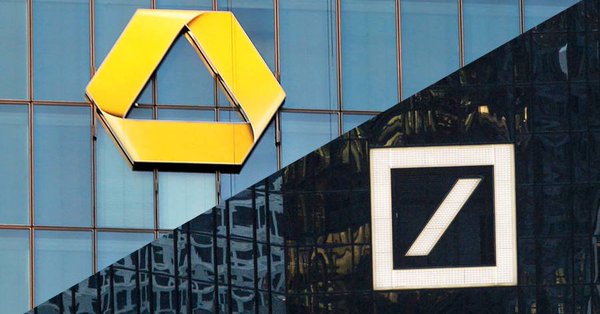The official story is one of creating a national champion, a German bank large enough to compete with American investment banks. The truth is far less heroic and a lot more sordid than that. Here is why Democracy in Europa is campaigning against this merger.
Yanis Varoufakis is co-founder of the Democracy in Europe Movement, DiEM25, an economist, and former Greek finance minister. He is currently a candidate for the EU Parliament in Germany for European Spring.
Cross-posted from Yanis Varoufakis’s website

Both banks are zombies. Commerzbank has gone through eight years of constant cost-cutting but still delivers profits of less than $1 per share at a time when the European Central Bank is bending over backwards to help Europe’s banks profit. Deutsche Bank is not doing much better. Since 2010 its share price has fallen from $77 to $8, its market value today is lower than it has been since 2008, and its return to equity is… negative.
If Deutsche Bank and Commerzbank merge, we shall have a disaster in our hands. Think about it: Together, the two banks have outstanding loans of $2 trillion. But their market capitalisation, or value, is less than $30 billion. Such a chasm between the merged bank’s value and its loans would be the definition of a gigantic zombie relying on the kindness of the German taxpayer and on the ECB’s readiness to turn a blind eye to its fragility.
This is all well known, as is the simple truth that you cannot create a healthy bank by marrying two zombies. So, the question is: Who is pushing for this merger and why? The answer is seriously disturbing and is one that German citizens must be made aware of: The whole affair is based on a trick that the financial engineers behind the merger are conjuring up, the result of which will be detrimental to the interests of German society. What is that trick? It is called “negative good will”.
In financial markets, the concept of ‘goodwill’ relates to an intangible asset – like buying a dead brand (e.g. NSU in the German car industry or TWA in the airline industry) which has potential for the buyer based on the goodwill toward the brand by customers who remember the dead brand. Normally, the buyer will pay more than the current price of such a brand and this excess payment will be attributed to goodwill. Negative goodwill is an odd concept but, in principle, it reflects the theoretical possibility that you are buying a dead brand for a low, low price. Then, financial accounting rules allow you to record this (negative goodwill) as an ‘asset’ in your books – even though it is an asset that has never been realised in dollar or euro terms.
So here is the key to understanding the push for the Deutsche-Commerz merger: The combined market value of the two banks is much, much lower than their combined audited value; i.e. the value that the German government says that these two banks have. As these lines are written, Deutsche Bank shares sell in Frankfurt’s stock exchange at a price 70% below their official audited value. Commerzbank’s shares are also selling at a price 66% lower than its official, audited level.
If and when Deutsche Bank buys Commerzbank, Deutsche would count as a new, magical asset (negative good will) the difference between the price of Commerzbank’s shares and its audited value. Given that the market value of their combined shares is $30 billion, a negative goodwill of approximately $16 billion will be added, magically, to the books of the new, merged bank. In simpler words, the financial engineers are about to create 50% more value from thin air for the merger – money that does not exist but which will give the new board of directors the opportunity to pretend that their new super-bank is healthier than it is. Guess what they will do immediately afterwards: They will give themselves another pay rise while closing down branches and firing thirty thousand of their much-less-well-paid employees in the name of consolidation and… efficiency.
This is not idle speculation. In 2018, while Deutsche Bank’s investment bank saw its revenues decline sharply, its head more than doubled his salary to €8.6m. The penchant of top managers for profiting at the expense of the rest of society did not stop at the gates of the bank. As top management was boosting its compensation from €29.8m in 2017 to €55.8m in 2018, at the very same time the bonuses going to lowering ranked Deutsche employees was cut by 14 per cent. The extent of this scandalous behaviour can be seen from a startling fact: Overall, in 2018 the bonuses to Deutsche Bank’s management exceeded the pre-tax level of its profits and amounted to more than five times the investment bank’s earnings!
Why is the federal government turning a blind eye to such behaviour and why does it support this dangerous fraud of a merger? The answer is simple: Because it is embarrassed that, ten years after the banking crisis began, Germany’s top banks are still zombies. And because Mrs Merkel’s government does not want to see eurozone banking rules, that her government agreed to, being imposed by the European Central Bank’s Single Supervisory Mechanism on banks like Deutsche Bank and Commerzbank. It is one thing that the eurozone common rules are applied to the Italian and the Greek banks and it is quite another thing, it seems, that they should be applied to Frankfurt-based banks that are, supposedly, national champions.
In short, a sordid political agenda is about to utilise a sordid financial trick in order to conspire against the interests of German taxpayers, bank employees and bank customers. This is why we, at Democracy in Europa, are opposing the Deutsche-Commerzbank merger.


Be the first to comment